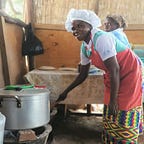“When the police say ‘We don’t want to see charcoal on our roads’ we will see victory.”
Q&A with Teddie Kamoto, Deputy Director of Forestry in Malawi’s Department of Forestry
With fewer than 80 active Forest Rangers covering all 88 Forest Reserves, law enforcement remains a critical challenge to protecting Malawi’s forests. As cities grow, the demand for charcoal as the main driver of deforestation continues to put enormous pressure on the government to react to Malawi’s illegal charcoal problem. In this interview, Teddie Kamoto, Deputy Director of Forestry within Malawi’s Department of Forestry, explains how they have capitalized on USAID and UKaid support to chart a course of strengthening law enforcement and improving forest management in Malawi.
Q: With five years of USAID support through the PERFORM project, followed by 2.5 years of support from the USAID and UKaid co-funded MCHF project, how has the overall Department of Forestry approach changed?
A: We regard the Modern Cooking for Healthy Forests project as part of us. Through PERFORM, USAID helped us to develop a series of instruments like the National Charcoal Strategy, the Landscape Restoration Strategy and the REDD+ Strategy, each playing a critical role. Now with MCHF, we are focused on how we can implement these instruments and strategies.
Q: How difficult is it to introduce new policy instruments within the Department of Forestry?
A: The first step is always making sure we have an understanding of what these documents are all about, and that has been difficult to achieve, but with the support of MCHF we are using communications to reach our staff and explain what we are trying to do. Secondly, we come from a background where people were used to doing things their way. We need to challenge the mindset of the past, and that applies to our staff, rural forest communities, and even the citizenry. This is a slow process and requires efforts from a wide variety of agencies, from the law enforcement to the judiciary, and that can be frustrating. But now we are seeing positive direction and we are seeing results.
Q: You mention law enforcement. How important are the police and other law enforcement agencies to controlling the explosion of illegal charcoal and curbing deforestation?
A: Law enforcement is currently the biggest problem. We rely on the Malawi police service. If we are talking about roadblocks, they are in their hands. For prosecuting cases, we rely on them. And sometimes we are disappointed by their actions, like allowing charcoal transporters access to the city. Corrupt behavior is the major challenge and includes both our staff and the staff of law enforcement agencies. We would love to see it end, but it’s a slow process in a country where the perception is that corruption is normal. We need to make a stronger effort in this area, because the corruption and conniving with charcoal traffickers does not only happen at the police level. It also happens in our department, and this is one of the reasons we needed to see laws change.
Q: Over the last year, both convictions and penalties for crimes related to illegal charcoal have increased. Is that progress?
A: Yes, the amended Forestry Act supported by PERFORM and MCHF has made it easier to enforce. We’ve seen the difference already. There are people who are arrested and serving custodial sentences. There are more than 20 vehicles that have been forfeited to the government. And we believe many people now make sure their vehicles are not taking part in trafficking illegal charcoal. This is a sign that things are working. But I truly believe that the day when the police say: we don’t want to see charcoal on our roads, we will see victory.
Q: When do you expect the production of illegal charcoal to plateau and decrease?
A: We still believe that for the next 20 to 30 years, biomass will dominate Malawi as the main cooking energy. The challenge is making sure that sustainable biomass is available to meet the increasing demand. We approach this on two fronts: one, the production of biomass through tree planting and natural regeneration, and two, dealing with illegal charcoal production. The current price of charcoal does not reflect the actual costs, and unless we deal with that element, those who are producing legal licensed charcoal will find it difficult to penetrate the market.
Q: So will people continue to use charcoal for many years to come?
A: We know that we cannot simply deprive people of charcoal without looking at how they will cook and survive without it. And again, thanks to MCHF, we see partners addressing that area making sure people in the city have options. But still some people believe in using charcoal because that’s what they have known over the years. So we need to see more sustainable charcoal and more people cooking with LPG gas. The adoption of new alternative cooking energies and fuel-efficient technologies needs to start with government staff. Government should deliberately introduce financing options to motivate its staff to adopt these cooking energies and technologies.
Q: It is clear the Department of Forestry is currently in a much better position than you were 10 years ago. What gives you the greatest optimism for the future of the forestry sector?
A: I am hopeful when I see the signs that people are beginning to understand what we are fighting for. If they don’t understand, then there is no point. There is more appreciation for forests, and that includes the police, who are seeing as part of an interagency strategy. We have better relationships, including with the criminal investigation unit. That kind of understanding gives us hope.
